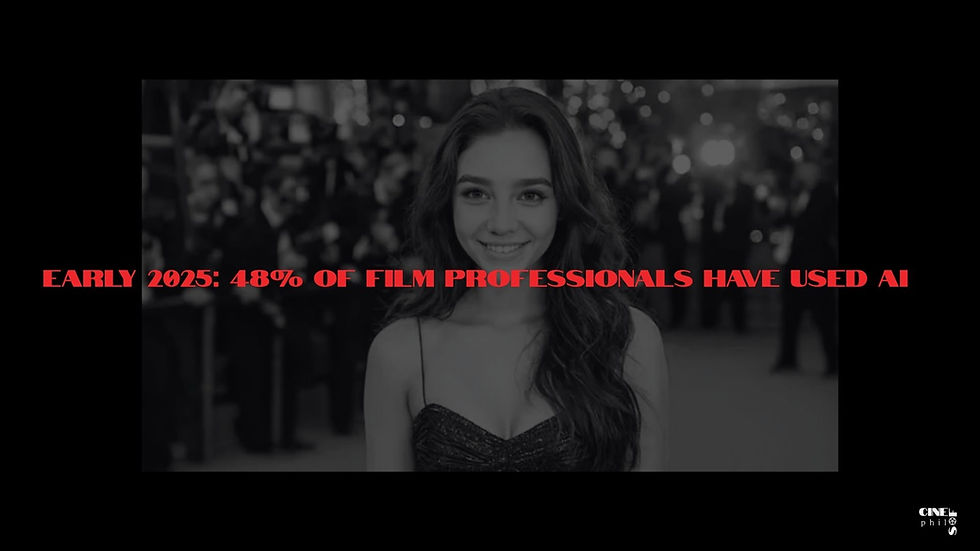Is AI Killing the Soundtrack of Our Lives?
- Sofia R. Willcox

- Sep 15, 2025
- 3 min read
Was 2025 a year without summer hits? While many point to the rise of glocalisation or the volatility of social media algorithms, I’d argue that we need to talk about the Velvet Sundown phenomenon, or outbreak.
Over the past decade, Spotify has faced repeated allegations of filling popular playlists with tracks by so-called "fake artists." Velvet Sundown feels like a natural extension of that, a fully AI-generated music project that dropped its debut album in June. And somehow, it worked. The band captured millions of ears across the globe and built a surprisingly passionate fanbase.
Nostalgia AI's Secret Success Formula
AI can't produce something entirely new—it relies on the pre-existing. It plays it safe, betting on human affective memory. That nostalgia becomes a low-risk strategy, tapping into a psychological shortcut to comfort, security, and connection—especially during times of uncertainty or societal stress.
Paradoxically, riding alongside that comfort is AI itself, the internet’s sweetheart, quietly dictating the trends.
But Velvet Sundown’s success goes even deeper. It’s not just about nostalgia. It’s fueled by human curiosity—and the Bandwagon Effect that seems to orbit anything AI touches.
How Does AI Manipulate the Human Ear?
AI is a learning model, trained on massive datasets to understand the underlying structures and patterns of human voices and music. By replicating familiar sounds—or generating entirely new compositions based on those learned patterns, AI creates auditory experiences that can feel surprisingly authentic. Listeners often perceive them as genuine, even when they’re completely synthetic.
Once trained, AI can produce new audio by applying these patterns, mimicking a specific person’s voice or composing music in a particular style with uncanny precision.
What makes this powerful is how it tricks the brain. Because AI-generated sounds follow familiar auditory cues, they trigger emotional and cognitive responses just like real human speech or music. We feel, remember, and even judge these sounds as real.
Over time, our brains may begin to adapt, but in doing so, we also become more vulnerable: to confusion, emotional manipulation, and even the formation of false memories.
A Soundtrack to Forget
Much has been said about how AI is replacing the arts, creative professionals, and music-making. What’s mentioned less often is its quiet omnipresence in the digital world. Spotify is just following the flock with its AI-generated playlists. On the surface, it aligns with convenience and the ever-accelerating pace of modern life, but deep down, it’s interfering with something profoundly human.
From Mixtapes to Playlists: The Lost Art of Intimacy
Playlists are today’s version of mixtapes and burned CDs. Once, curating a collection of songs for someone was an act of intimacy, an unspoken form of communication between acquaintances, friends, lovers. While the tech-shy dedicated songs over the radio, the bold stood outside with car serenades.
The Mechanization of Connection
With this new mechanization, we lose those unique connections, those small, iconic moments only music can provide. These are the nuances a machine simply can’t capture and never will. Music has always been a remedy for an increasingly unwell society. It’s like taking a snapshot of a feeling, a moment, a memory—making it tangible, giving it a body, making it immortal.
Beyond that, it is a shared experience, whether at live shows, through speakers, or between headphones. Music has always been a social glue.
For me, memories always come with a soundtrack. In my world, people are music. I remember the details like the back of my hand, stories marked by smells, by smiles. I wear saudade on my sleeve. Connections grow distant; they become playlists.
AI is Replacing Emotion with Algorithms
AI replaces spontaneity with prediction. Emotion with algorithm. Maybe in the future this will pass, as some sort of genre or subgenre. However, in an era of hyper-connection, we are all disconnected.
The rise of loneliness, dating burnouts, voluntary celibacy, and AI relationships is evolving. AI companionship and AI music both fill emotional voids, but in very different ways.
Summer means warmth, songs that stick, and long-lasting saudades. Maybe 2025 didn’t lack summer hits. Maybe it didn’t sound wrong. It just didn’t sound like us. Can there be summer without a song to remember it by?




Comments